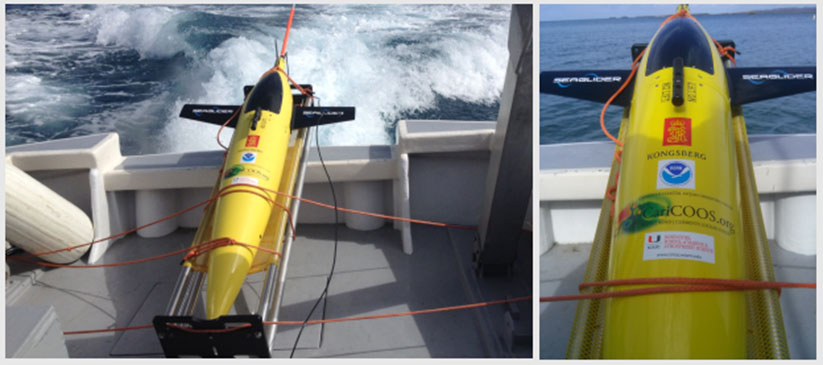Last month, NCCOS and NOAA’s Atlantic Oceanographic and Meteorological Laboratory (AOML) hosted a joint virtual symposium to share knowledge about their respective research activities and to identify potential opportunities for collaboration.

Water property data collected by AOML's autonomous underwater vehicles (shown here) would enhance NCCOS's habitat characterization efforts. Credit: AOML.
Roughly 150 people participated in the three-day conference, which was organized into nine separate sessions focused on:
-
- Coral reef research
- Harmful Algal Blooms (HABs), hypoxia, and pathogens
- Integrated Ecosystem Assessments (IEAs) and ecosystem science
- Pollution (contaminants, marine debris, and oil research)
- Environmental DNA (e-DNA) and genomics: from microbes to mammals
- Climate, extreme weather, and ocean acidification impacts on ecosystems
- Uncrewed systems and advanced sampling technologies
- Physical modeling: needs, development, and link to applications
- Ecosystem modeling and forecasting
Within each session, researchers from both institutions gave short presentations on relevant investigations and programs, which were followed by a group discussion on collaborative opportunities and next steps. Attendees identified many opportunities for NCCOS and AOML scientists to align their efforts.
For example, applying modeling and monitoring capabilities from both institutions would enhance HAB forecasting and detection and socio-ecological research on climate resilience. Water property data collected by AOML's autonomous underwater vehicles (e.g., temperature, salinity, dissolved oxygen, chlorophyll concentrations) could inform NCCOS's habitat characterization efforts. Also, sharing resources would advance the use of artificial intelligence to predict the fate and resilience of coral colonies to environmental stressors.
Symposium organizers will continue to brief NCCOS and AOML leadership about ongoing developments. Moving forward, both institutions anticipate that their researchers will build on current cooperative efforts and identify additional areas for collaboration.
 Official websites use .gov
A .gov website belongs to an official government organization in the United States.
Official websites use .gov
A .gov website belongs to an official government organization in the United States. Secure .gov websites use HTTPS
A lock or https:// means you’ve safely connected to the .gov website. Share sensitive information only on official, secure websites.
Secure .gov websites use HTTPS
A lock or https:// means you’ve safely connected to the .gov website. Share sensitive information only on official, secure websites.